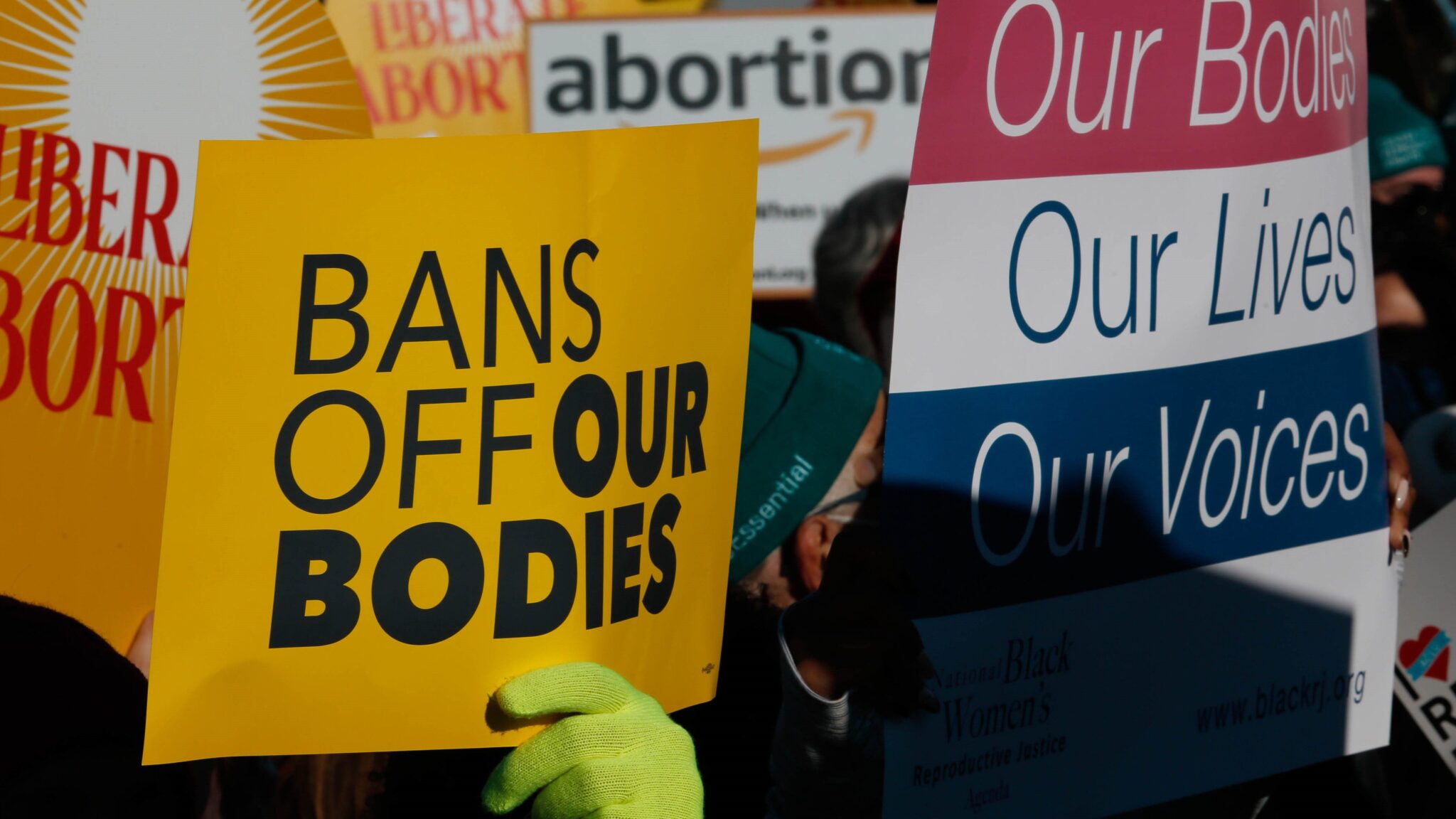Michigan 1800s-Era Abortion Ban Struck Down
A “friend of the court” brief filed by the Center on behalf of Mothering Justice and partners challenged the ban enacted before women and Black, Indigenous and other people of color had the right to vote.

On September 7, the Michigan Court of Claims issued a permanent injunction striking down the state’s pre-Roe abortion ban, which it held violates the right to bodily integrity and equal protection under Michigan’s constitution.
The decision came after the Center for Reproductive Rights filed an amicus brief in the Michigan Court of Claims and Michigan Supreme Court on behalf of Mothering Justice, Northland Family Planning, Medical Students for Choice, and the Center for Black Maternal Health and Reproductive Justice at Tufts University School of Medicine. The brief, filed August 18, argues that the state’s 1800s-era abortion ban violates Michigan’s constitution because, among other substantive claims, it discriminates on the basis of race.
The Michigan Legislature passed the ban in 1846—when women and Black, Indigenous, and other people of color were deprived of the right to vote and subject to a slew of discriminatory policies—and revised it in 1931. The ban would have made it a felony for providers to perform abortions in all instances except to preserve the life of the mother. Anti-abortion state lawmakers have attempted to enforce the pre-Roe ban in light of the U.S. Supreme Court’s ruling in June revoking the constitutional right to abortion.
Read the brief filed by the Center.
Amicus Brief Challenging Michigan’s Pre-Roe Abortion Ban
Among its several claims, the brief argues that the state’s abortion ban violates Michigan’s constitution because it discriminates on the basis of race.
In her decision to strike down the ban, the judge held that the Michigan Constitution’s Due Process Clause is more expansive than the parallel clause in the Fourteenth Amendment of the U.S. Constitution. The judge noted that “[a]lmost a century, two world wars, a constitutional amendment granting women the right to vote, the emergence of a civil rights movement, and a sea change in laws regarding women’s status” separated the adoption of the Fourteenth Amendment in 1868 and the ratification of Michigan’s constitution in 1963. As such, she concluded that the federal Due Process Clause bears “little resemblance to the understanding of personal freedom, particularly for women and people of color, motivating those who drafted and ratified our 1963 Constitution.”
The judge also recognized that the abortion ban would have deprived women not only of autonomous decision-making over their bodies and medical care, but of the ability to decide when and under what conditions to have children. The Michigan law “controls her ability to be the mother she wants to be,” the judge wrote in the decision. “The statute not only compels motherhood and its attendant responsibilities; it wipes away the mother’s ability to make the plans she considers most beneficial for the futures of her existing and desired children.”
The judge noted that “particularly helpful briefs filed by amici curiae” informed her decision to find the abortion ban unconstitutional. The Court applied the compelling reason test outlined in the Center’s brief in holding that the scope of the Michigan Constitution is broader than the U.S. Constitution. As the judge explained, the compelling reasons test enables Michigan courts to “interpret provisions of Michigan’s Constitution independently of the Supreme Court of the United States, both to protect Michiganders’ individual rights, and when ‘compelling reasons’ supports doing so.”
Brief Filed in Support of Planned Parenthood Lawsuit
In April, Planned Parenthood filed a lawsuit in the Michigan Court of Claims challenging the constitutionality of the state’s ban. Governor Whitmer also filed a lawsuit in April, asking the Michigan Supreme Court to decide the legality of the ban and to rule that the state constitution protects the right to abortion. The Michigan Supreme Court has not yet said whether it will hear Governor Whitmer’s case, though it has sought supplemental briefing and accepted a “friend of the court” brief from the Center.
The brief’s co-signers outline how the near-total abortion ban would disproportionately restrict Black people’s reproductive autonomy, exacerbating health disparities and entrenching cycles of poverty. The brief argues that the collective protections afforded by the Michigan Constitution for equality, liberty, and freedom from government restraint, including the unique and broad protections against race-based discrimination, must be read together to protect the rights of people living at the intersection of sex, race, and poverty-based discrimination.
Michigan Ban Would Violate the State Constitution’s Protection Against Racial Discrimination
The brief submitted notes that the Michigan Constitution has stronger protections against racial discrimination than the U.S. Constitution. While the word “discriminate” does not appear in the Fourteenth Amendment of the U.S. Constitution, the Michigan Constitution guarantees that no person shall “be denied the enjoyment of his civil or political rights or be discriminated against in the exercise thereof because of religion, race, color or national origin.”
Read more.
The Center’s Amicus Work
The Center files “friend of the court” amicus briefs in cases with the ability to inform and influence legal precedent on reproductive rights, constitutional law, and international law.
The amici write that the ban “discriminates against members of a protected class because it disproportionately impacts Black pregnant people’s ability to make autonomous decisions about their reproductive health and lives, imposing devastating health harms and economic hardships on Black communities.” For this reason, the brief argues that Michigan’s 1800s-era pre-Roe abortion ban violates the state constitution’s prohibition against racial discrimination.
Eboni Taylor, Michigan Executive Director of Mothering Justice, an advocacy organization that co-signed the brief, said, “Protecting the right to bodily autonomy, especially for pregnant and birthing people of color, is not only the common-sense approach but also one of preservation, where the unraveling of other rights that mothers of color would be disproportionately impacted by is diminished.”
“Abortion bans are without a doubt archaic and a very poignant flashback to Black women’s forced pregnancies in chattel slavery, so the time we’re in marks a continuation of the inability of Black women and pregnant people to choose,” Taylor added. “To that end, we vehemently stand with Gov. Whitmer and our partners in supporting legislation that protects the health and bodily autonomy of pregnant and birthing people in Michigan.”
Ban Would Disproportionately Harm Low-income, Black and Indigenous Communities
The Center for Black Maternal Health and Reproductive Justice at Tufts University School of Medicine, which also co-signed the brief, warned that by forcing people to carry unwanted pregnancies to term, the ban would exacerbate existing health and economic disparities, especially for low-income, Black and Indigenous communities.
The brief supports this point with the following evidence:
- The United States is the only country in the world with an advanced economy where the maternal mortality ratio is worsening, according to the World Health Organization. In Detroit, the maternal mortality rate is three times the national average.
- Black pregnant people in the U.S. face heightened maternal mortality risks due to structural racism, systemic poverty, provider bias, and inadequate access to prenatal and post-natal care.
- Black women experience the highest rates of maternal mortality in Michigan, with Black women 4.5 times more likely to die than white women.
- Michigan’s ban would compound systemic health disparities experienced by Black communities in the state, including those caused by the Flint water crisis and the Covid-19 pandemic.
The brief also contends that Michigan’s ban would perpetuate economic inequality and further entrench poverty across the state, with disproportionate impacts on Black communities.
- Michigan’s ban would reinforce cyclical poverty. Amici note that structural inequities including systemic barriers to contraception lead people with lower incomes to experience disproportionately higher rates of unintended pregnancy. People living in poverty comprise about 75% of people who have abortions in the United States.
- Forcing people to give birth would compel them to raise children under inequitable circumstances. As the brief notes, studies show that children born to women who have been denied an abortion are more likely to live below federal poverty guidelines than children born in a subsequent pregnancy to women who received the abortion.
- The economic impact of Michigan’s ban would heighten racial health disparities. Black infants in Michigan already face lower survival rates than white infants, due in part to the Flint water crisis.
Amici write that for Black communities, Michigan’s pre-Roe ban would worsen infant health outcomes and “exacerbate an already fragile state of food insecurity, financial distress, barriers to healthcare and stable housing, diminishing any hope of intergenerational wealth.”
Ban Would Also Jeopardize Accreditation of Medical Residency Programs
Medical Students for Choice, which also co-signed the brief, warned that the abortion ban could potentially jeopardize the accreditation of medical residency programs in the state and “discourage medical students and physicians from all practice areas from joining Michigan medical schools and programs.” The American College of Obstetricians and Gynecologists and the Society of Family Medicine require that accredited OB/GYN programs provide students with training in abortion care.
The brief was filed by the Center’s Senior Counsel Genevieve Scott, Staff Attorney Kulsoom Ijaz, Legal Fellow Astrid Ackerman, and David A. Moran of the University of Michigan.
Click here to read the full amicus brief.



